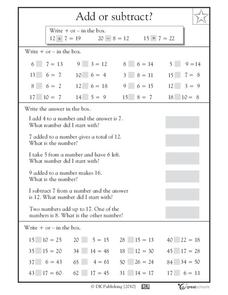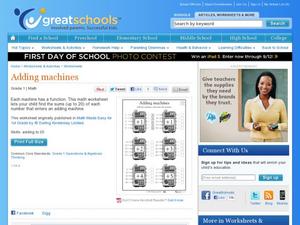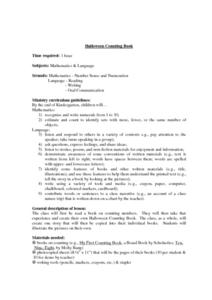Curated OER
Add or Subtract (up to 50)
Do you add or subtract? It's up to your mathematicians as they fill in the symbol for 16 equations to make them true. The numbers in this section don't exceed 18. Next, learners answer six word problems by determining the missing addend...
Curated OER
Product Puzzle
Make multiplication facts a little more fun using a crossword puzzle! Learners solve twenty-eight problems and fill in the puzzle as they go. The advantage is that they know if they have done something wrong because of discrepancies in...
Curated OER
Coordinates
For beginning point plotters, these graphs give a good introduction. They examine a graph with shapes drawn onto it and each vertex labeled. There are 20 total, and scholars write the coordinates of each labeled point. All of these are...
Curated OER
Fact Families - Part 2
Complete these fact families; mathematicians use addition number sentences to write three more equations, all of which are members of the same fact family. There is an example here to guide them, and they solve for nine more number...
Curated OER
Greatest Common Factor
These multiples share a few factors, but which one is the greatest? Scholars list the factors for various number pairs, first just indicating common factors. Next, they do the same but write down the greatest common factor. Finally,...
Charleston School District
Pre-Test Unit 1: Exponents
How much do you know about exponents? The pre-test covers the concepts of integer exponents with both numerical and algebraic one-variable expressions. The test is also over representing numbers in scientific notation, operating with...
Curriculum Corner
Summer Theme Find A Fact
Have young mathematicians find multiplication and division facts in an 8x8 summer-themed grid. Class members identify three sets of numbers that include a quotient and product by inserting the appropriate signs between each number to...
Curated OER
Explore Subtraction
Learnersare given 26 tables and graphs in which they must fill in missing numbers and graph equations. They subtract a given value of x from a constant number, and use a number line to subtract larger numbers from smaller ones resulting...
Houghton Mifflin Harcourt
Challenge: Parentheses, Please!
Given a string of numbers and math symbols, learners take the challenge to insert parenthesis in the proper places to reach certain solutions. This is a challenge, indeed, an engaging enrichment for those who need a little more math!
DK Publishing
Addition, Multiplication, and Division
These equations are missing numbers, and scholars must process multiple operations to complete them. There are addition, multiplication, and division problems here, each missing an addend, divisor, or factor. After completing 24 of these...
Curated OER
Counting Back
Where does the frog stop? Help youngster visualize subtraction with a frog on 10 steps. He starts on the step coordinated with the minuend and hops down based on the subtrahend. By doing this, scholars are counting on backwards and...
Super Teacher Worksheets
Number Patterns
Pattern recognition is an essential step in the development of young mathematicians fluency with the four basic operations. This simple skills practice worksheet asks children identify and complete three different numerical patterns,...
Primary National Strategy
Ordering and Counting
Are you in need of a 5-day unit intended to teach little learners how to count to 20? This is a well-structured complete set of lessons which employ a variety of methods to instruct learners about various ways to count from 1 to 20. They...
Curated OER
Adding Machines
Turn your first graders into adding machines! This is a fun way to practice single-digit addition, and scholars complete 25 equations. Each machine has a function; five numbers go into the machine, are added to, and emerge on the other...
Curated OER
Ordering Sets of Measures
This isn't an ordinary number sequencing activity; as scholars put these values in order they must pay close attention to the units attached. Each set of numbers has different units of measurement, so they must convert to order them from...
NTTI
If You Hopped Like a Frog
Get your frogs hopping by introducing them to the concepts of ratio and proportion. As a class, they perform arithmetic operations using ratios then discover how they represent quantitative relationships. In groups, they write their own...
Curated OER
Halloween Counting Book
First graders recognize and write numerals from 1 to 10. They estimate and count to identify sets with more, fewer, or the same number of objects, listen and respond to others in a variety of contexts, and take turns speaking in a...
Curated OER
Fraction Follies
Explore the multiplication and division process for fractions with this interactive presentation. Through visual fraction problems, your math learners will uncover common assumptions and errors in computing fractions and how to avoid...
Curated OER
Comparing and Ordering Decimals
Which decimal is greater? Learners start by comparing eight pairs of decimals, writing in the symbol (> or <) to indicate values. The next two sections involve sets of three decimals. They start by circling the decimal with the...
Curated OER
Coordinate Graphs
As you introduce coordinate graphs to scholars, be sure to use guided worksheets like this one. Using an example for guidance, they write the coordinates of five points on a graph, each distinguished as a shape symbol. Next, scholars do...
Curated OER
Multiples of 7
What is three sevens? What about five sevens? Practice times tables with a learning exercise that provides several ways to multiply seven by different numbers. The last section features two word problems and spaces to write the answers....
Curated OER
What's the Average?
Practice finding the averages of different groups of numbers. Third graders review an example at the top of the page, then find the averages of fourteen groups of numbers (with eight numbers in each group). The instructional activity is...
Mathematics Assessment Project
Expressions and Equations
Express your wonder at this resource. Middle schoolers solve 10 short problems in the expressions and equations domain. They apply operations with scientific notation, set up and solve equations, and analyze linear equations.
Curated OER
A Model for Tens and Ones: Reading an Abacus
Interpreting pictures of an abacus, learners write 2-digit numbers. They read and transcribe abacus beads in the tens and ones places. For extension, they draw pictures to represent the numbers 9 and 90. Really bring it to life using a...

























